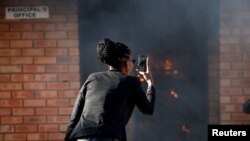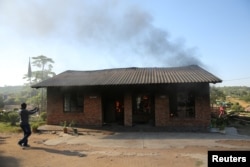“They are burning memory,” intoned the chancellor of the University of Johannesburg, as a room full of academics nodded gravely.
“Fire as a weapon of protest has spread throughout the higher education system,” warned Professor Njabulo Ndebele, delivering a condemnation of a worrying trend that evokes the darkest days of apartheid, the recent torching of South African educational structures as part of a growing student protest movement.
As in the 1970s, today’s protesters say they are living in a system that marginalizes black South Africans socially, economically, linguistically and philosophically. Top universities are still adorned with the names and images of dead white colonial leaders; most classes are taught in English and Afrikaans; and some critics say white men are still over represented.
In February, students at the University of Cape Town set alight paintings of colonial leaders. That seems to have inspired other conflagrations, most recently, the torching of the law library at the University of KwaZulu-Natal earlier this month. Often, the fires come at the climax of student protests demanding free education and greater material support.
The fires have drawn widespread condemnation, but also, attention.
“No amount of anger should drive students to burn their own university and deny themselves and others education,” President Jacob Zuma said in February. “The burning of university buildings at a time when we are prioritizing the education of our youth is inexplicable and can never be condoned.”
Ndebele says today’s protesters feel smothered.
“In the unfolding events, it became clearer that the incineration of collected white colonial objects as embodiments of whiteness was the onset of a declared process to decolonize the University of Cape Town and rid it of aspects of its legacy that made for a campus environment in which it was impossible to breathe for those for whom such a legacy was not built and which they felt consigned them to silence,” he said this week at the University of Johannesburg.
Schools torched
Just a short walk from Ndebele’s lectern, UJ’s biggest auditorium remains a pile of debris, the work of unknown arsonists in May. Dozens of schools have been torched this year amid protests over a myriad of issues, all with a common theme, that South Africa’s post-apartheid government has not lived up to its promise.
South African universities have reacted to the recent wave of student protests by embarking on a mission of “decolonization”, a term with many meanings depending on who you ask. It has variously been defined as a restructuring of curricula to include African languages and philosophy, as a removal of colonial relics from universities, as a redressing of racial inequalities, and even as a return of white-owned land to its original owners.
Attention grabber
UJ property management student Cleopatra Mutsila says the outrage over torched buildings is misplaced. She says the reason for the fires is simple: they capture attention.
"It’s funny,” she said. “... When black people continue to be oppressed, when we speak about black pain, when black people die every day in this country, nobody says anything. But when you burn a building in a white institution, everyone is up in arms telling us we are hooligans, we are this and that and that and that.”
At 24, Mutsila is part of what is called South Africa’s “born-free” generation, born in the dying days of apartheid. But, she says, she is not free, and she will continue to protest until she is.





